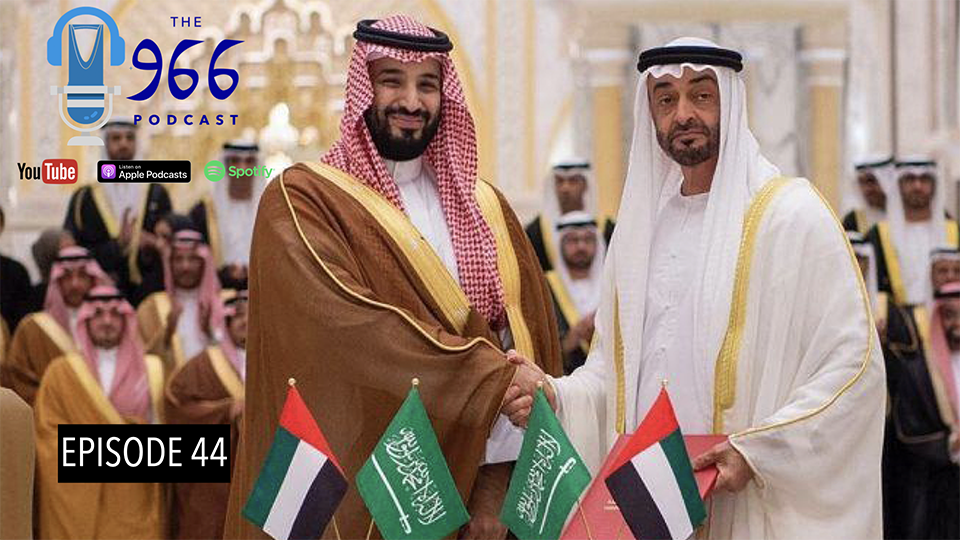Episode 44  The hosts talk about the UAE’s long-time de facto ruler Sheikh Mohamed bin Zayed Al Nahyan, who was elected as president of the UAE a day after the death of former leader Sheikh Khalifa. They also discuss Saudi Arabia’s Public Investment Fund’s (PIF) new venture into the nascent coffee sector in caffeine-thirsty Saudi Arabia. It’s a shorter episode this week with no special guest as the hosts gear up for a busy few weeks ahead, leaving plenty of time to tackle the six top storylines in Saudi Arabia this week in the program’s ‘Yallah’ segment.
The hosts talk about the UAE’s long-time de facto ruler Sheikh Mohamed bin Zayed Al Nahyan, who was elected as president of the UAE a day after the death of former leader Sheikh Khalifa. They also discuss Saudi Arabia’s Public Investment Fund’s (PIF) new venture into the nascent coffee sector in caffeine-thirsty Saudi Arabia. It’s a shorter episode this week with no special guest as the hosts gear up for a busy few weeks ahead, leaving plenty of time to tackle the six top storylines in Saudi Arabia this week in the program’s ‘Yallah’ segment.
The UAE’s de facto leader Sheikh Mohammed bin Zayed al-Nahyan was elected president of the Gulf Arab state by a federal supreme council, following the death of Sheikh Khalifa.
MbZ, as he is known, is 61. He had already been in power for years in a period when Sheikh Khalifa suffered bouts of illness, including a stroke in 2014.
7:46 – Lucien’s one big thing this week is the Saudi PIF’s new company, the Saudi Coffee Company, and why the announcement is especially interesting in its ambition for the nascent coffee sector.
The PIF is starting the new coffee company which will “provide support to the national coffee industry through the entire supply chain, from bean to cup.”
It will also play a key role in developing production in the southern Jazan region, home to the Coffee Arabica, it said.
The Saudi Coffee Company plans over the next 10 years to invest nearly 1.2 billion Saudi riyals ($320m) in the national coffee industry, with the goal of boosting the country’s production from 300 tonnes per year to 2,500 tonnes per year.
The company also aims to establish a dedicated academy to train local talent, entrepreneurs, coffee plantation owners and farmers as part of PIF’s focus on creating opportunities for small businesses and start-ups.
_
15:56 – Yallah  Six top storylines this week to get you up to date headed into the weekend…
Six top storylines this week to get you up to date headed into the weekend…
•Saudi production capacity to reach 13.3 mil-13.4 mil b/d by 2026-27
Saudi Arabia’s crude production capacity is poised to reach 13.3 million-13.4 million b/d by end-2026 or early 2027 as it looks to ramp up work at the Neutral Zone fields with Kuwait, Energy Minister Prince Abdulaziz bin Salman said May 16. The kingdom currently has the capacity to pump more than 12 million b/d of crude.
_
_
•How expats can apply for Saudi Arabia’s Premium Residency visa in three simple steps
Eligible expats can now apply for Saudi Arabia’s Premium Residency Visa in three simple steps through its newly announced Unified National Platform for Visas.
Chaired by the kingdom’s Prime Minister King Salman bin Abdulaziz Al Saud, the Saudi Cabinet revealed a slew of new regulations on Tuesday, May 17, including the organisation of a Premium Residency Centre and the Unified National Platform for Visas, under the jurisdiction of the Ministry of Foreign Affairs.
_
•Saudi ministry mulls two-day weekend for all private-sector workers
Saudi Arabia’s Ministry of Human Resources and Social Development has said that it is studying the prospects of amending the Labor Law article related to working hours to increase the weekly off to two days for all workers in the private sector, according to the Saudi Gazette.
_
•100 religious leaders gather in Saudi Arabia for ground-breaking conference
The Muslim World League (MWL) has completed the Forum on Common Values among Religious Followers event in Riyadh, Saudi Arabia from 11 to 12 May 2022. The Forum, for the first time in history, convened within Saudi Arabia Christian, Jewish, Hindu and Buddhist religious leaders alongside Islamic leaders to explore shared values and a common global vision for interfaith cooperation. Approximately 100 religious leaders attended the first of its kind conference, including over 15 Rabbis.
_
•Saudi students win 6 prizes in US science contest
Saudi students picked up six prizes at the Regeneron International Science and Engineering Fair 2022, in Atlanta, Georgia, equaling their record haul for the 16th year in a row. Arab News reports that the ISEF 2022 saw the participation of pre-college students from over 80 countries in the biggest competition showcasing innovation in scientific research and advancement.
_
•Climate Change in the Middle East and North Africa: Hosting Negotiations and Catalyzing Action
In March, Dubai hosted the first Middle East and North Africa Climate Week, a United Nations event aimed at strengthening discussions about climate change and climate action among a wide range of regional stakeholders. Regional climate weeks are a new engagement mechanism encouraged by the 2021 Glasgow Climate Pact to accelerate regional collaboration. So, it was noteworthy that the Middle East and North Africa held the first regional event, given the region’s recent transformation from an obstructionist negotiation bloc to a group of countries with ambitious climate goals.









